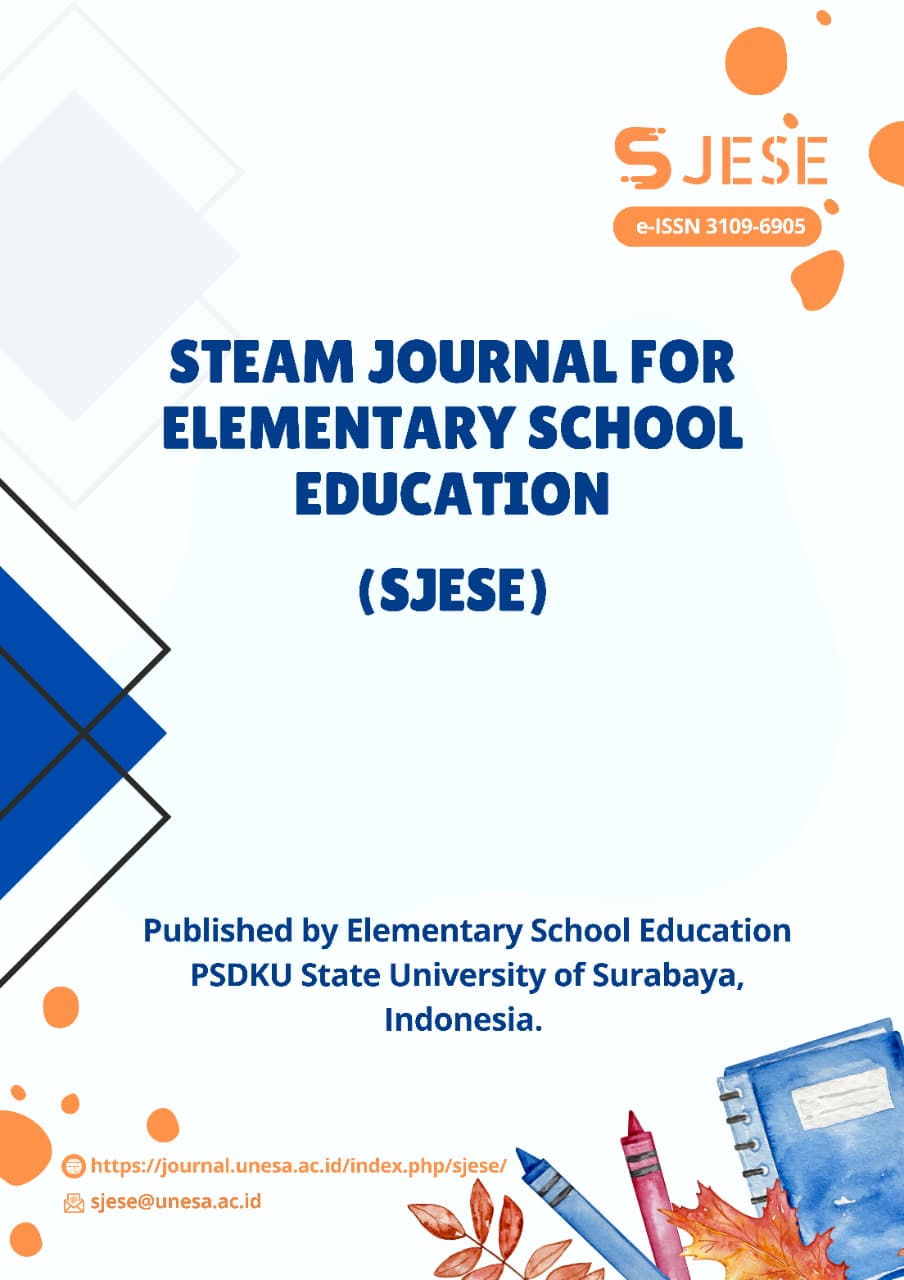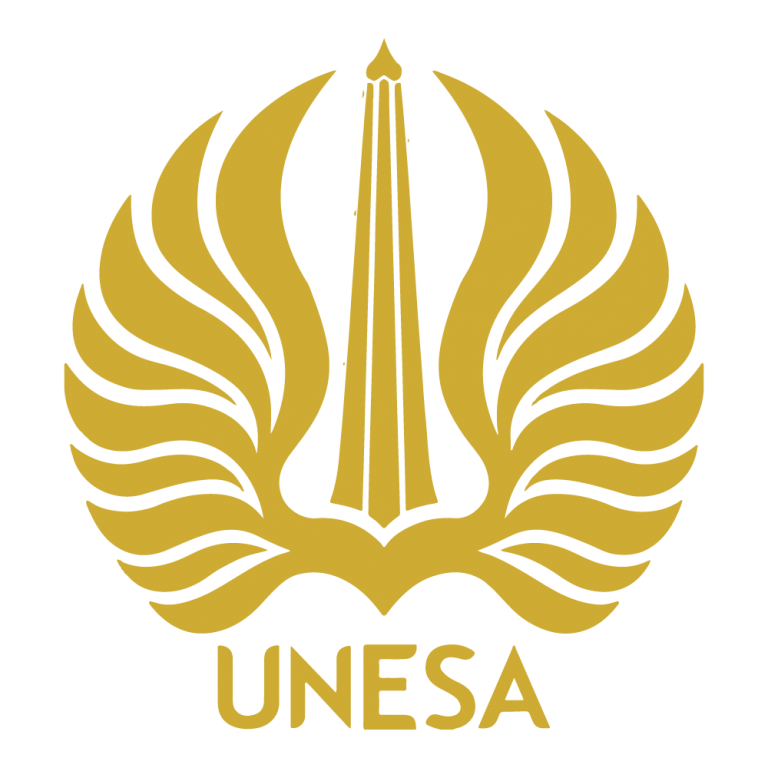Marshmallows, Fun, and Constellations: A Mixed-Methods Evaluation of a STEAM Astronomy Workshop
DOI:
https://doi.org/10.26740/sjese.1.02.2025.5Keywords:
STEAM education, astronomy education, non-formal learning, science engagement, creative pedagogyAbstract
This study evaluates a STEAM-based astronomy workshop for children, delivered at two science engagement events in Malta: Science in the City 2023 and Unconventional Science Careers Days 2023. The workshop integrated storytelling, mythological narratives, creative making activities, and digital tools within the 5E instructional model and the creative pedagogy CREATIONS, with constellations as the central theme. Using a mixed-methods approach, we collected survey data from 122 participants (aged M=10, SD=2.4) and practitioner observations. Quantitative analysis showed that most children (80.3%) found the workshop easy to understand, though 91.8% reported not learning new content. Despite this, 51.6% expressed strong interest in learning more about astronomy, and 55.7% wanted similar school workshops. Significant differences emerged by setting: open-air festival participants reported higher levels of enjoyment and clarity than classroom-based participants. Qualitative analysis revealed children emphasized astronomy knowledge, enjoyment, and creative processes, often linking learning to personal contexts such as zodiac signs. Practitioner observations highlighted parental involvement as both supportive and potentially intrusive. These findings suggest STEAM workshops emphasising artistic processes, can stimulate curiosity, engagement, and cultural relevance in astronomy education, while underscoring the importance of facilitator training and careful scaffolding to balance creativity with conceptual accuracy. The study contributes to research on non-formal STEAM learning by demonstrating the potential and challenges of integrating arts, storytelling, and science in astronomy education.
References
Αmpartzaki, M., Chatzoglidou, S., Kalogiannakis, M., Tassis, K., Pavlidou, V., Christidis, K., & Eleftherakis, G. (2024). Training Professional Kindergarten Teachers and Preservice Kindergarten Teachers in Astronomy Education: The Challenges of the ABATAC Project. European Journal of Education and Pedagogy, 5(2), 113–122.
Ancona, A., Ferri, M., Sánchez, A., & Crocco, F. (2024). The 5E instructional model in the meaningful learning of science. Frontiers in Education, 9, 1435530. https://doi.org/10.3389/feduc.2024.1435530
Ampartzaki, M., Tassis, K., Kalogiannakis, M., Pavlidou, V., Christidis, K., Chatzoglidou, S., & Eleftherakis, G. (2024). Assessing the Initial Outcomes of a Blended Learning Course for Teachers Facilitating Astronomy Activities for Young Children. Education Sciences, 14(6), 606. https://doi.org/10.3390/educsci14060606
Bogner, F. X., Schmid, S., & Dieser, O. (2013). D3.3 the PATHWAY to IBSE. http://pathway.ea.gr/sites/default/files/D3.3_the_PATHWAY_to_IBSE_ENGLISH_0.pdf
Braun, V., & Clarke, V. (2006). Using thematic analysis in psychology. Qualitative Research in Psychology, 3(2), 77–101. https://doi.org/10.1191/1478088706qp063oa
Bybee, R. W., Taylor, J. A., Gardner, A., Scotter, P. V., Powell, J. C., Westbrook, A., & Landes, N. (2006). The BSCS 5E instructional model: Origins and effectiveness (No. 5 (88-98)). BSCS. https://fremonths.org/ourpages/auto/2008/5/11/1210522036057/bscs5efullreport2006.pdf
Chappell, K., Hetherington, L., Juillard, S., Aguirre, C., & Duca, E. (2025). A framework for effective STEAM education: Pedagogy for responding to wicked problems. International Journal of Educational Research Open, 9, 100474. https://doi.org/10.1016/j.ijedro.2025.100474
Chappell, K., Hetherington, L., Keene, H. R., Wren, H., Alexopoulos, A., Ben-Horin, O., Nikolopoulos, K., Robberstad, J., Sotiriou, S., & Bogner, F. X. (2019). Dialogue and materiality/embodiment in science|arts creative pedagogy: Their role and manifestation. Thinking Skills and Creativity, 31, 296–322. https://doi.org/10.1016/j.tsc.2018.12.008
Chappell, K., Hetherington, L., Ruck Keene, H., Slade, C., & Cukorova, M. (2016). CREATIONS D2.1 The features of inquiry learning: Theory, research and practice. https://doi.org/H2020-EU.5.a: 665917
Christidou, D., Voulgari, I., Tisza, G., Norouzi, B., Kinnula, M., Iivari, N., Papavlasopoulou, S., Gollerizo, A., Lozano González, J. M., & Konstantinidi Sofrona, D. (2022). Obstacles and challenges identified by practitioners of non-formal science learning activities in Europe. International Journal of Science Education, 44(3), 514–533. https://doi.org/10.1080/09500693.2022.2035466
Constantinou, C. P., Tsivitanidou, O. E., & Rybska, E. (2018). What Is Inquiry-Based Science Teaching and Learning? In O. E. Tsivitanidou, P. Gray, E. Rybska, L. Louca, & C. P. Constantinou (Eds.), Professional Development for Inquiry-Based Science Teaching and Learning (Vol. 5, pp. 1–23). Springer International Publishing. https://doi.org/10.1007/978-3-319-91406-0_1
Deák C, Kumar B. A Systematic Review of STEAM Education’s Role in Nurturing Digital Competencies for Sustainable Innovations. Education Sciences. 2024; 14(3):226. https://doi.org/10.3390/educsci14030226
Dijkstra, A. M., Russo, P., & Rojas, G. (2014, May 5). Inspiring and cultivating science awareness in young audiences through dialogue and astronomy. Discussion of three experiences. Proceedings of PCST 2014. 13th International Public Communication of Science and Technology Conference, PCST 2014: Science communication for social inclusion and political engagement. https://research.utwente.nl/en/publications/inspiring-and-cultivating-science-awareness-in-young-audiences-th
Duo-Terron, P., Hinojo-Lucena, F.-J., Moreno-Guerrero, A.-J., & López-Núñez, J.-A. (2022). STEAM in Primary Education. Impact on Linguistic and Mathematical Competences in a Disadvantaged Context. Frontiers in Education, 7. https://doi.org/10.3389/feduc.2022.792656
Farrugia, D. M., Pace, P., & Duca, E. (2024). Citizens’ participation in informal science activities in Malta. Malta Review of Educational Research, 18(1), 31-52.
Field, A. (2009). Discovering Statistics Using IBM SPSS Statistics (3rd edn). SAGE.
Hartikainen, H., Ventä-Olkkonen, L., Cortés Orduña, M., Sánchez Milara, I., Sharma, S., Norouzi, B., & Kinnula, M. (2022). A Series of Fortunate Accidents: Lessons Learned When Things Go Sideways in Making Projects with Children. 6th FabLearn Europe / MakeEd Conference 2022, 1–4. https://doi.org/10.1145/3535227.3535247
Herro, D., & Quigley, C. (2017). Exploring teachers’ perceptions of STEAM teaching through professional development: implications for teacher educators. Professional Development in Education, 43(3), 416-438.
Hu, J., Gordon, C., Yang, N., & Ren, Y. (2021). “Once Upon A Star”: A Science Education Program Based on Personification Storytelling in Promoting Preschool Children’s Understanding of Astronomy Concepts. Early Education and Development, 32(1), 7–25. https://doi.org/10.1080/10409289.2020.1759011
Jensen, A. M., Jensen, E. A., Duca, E., & Roche, J. (2021). Investigating diversity in European audiences for public engagement with research: Who attends European Researchers’ Night in Ireland, the UK and Malta? Plos one, 16(7), e0252854.
Joy, A., Law, F., McGuire, L., Mathews, C., Hartstone-Rose, A., Winterbottom, M., Rutland, A., Fields, G. E., & Mulvey, K. L. (2021). Understanding Parents’ Roles in Children’s Learning and Engagement in Informal Science Learning Sites. Frontiers in Psychology, 12. https://doi.org/10.3389/fpsyg.2021.635839
Kahn, K. M., Megasari, R., Piantari, E., & Junaeti, E. (2018). AI programming by children using Snap! Block programming in a developing country. 11082. https://ora.ox.ac.uk/objects/uuid:9a82b522-6f9f-4c67-b20d-be6c53019b3b
Koehler, M., & Mishra, P. (2009). What is Technological Pedagogical Content Knowledge (TPACK)? Contemporary Issues in Technology and Teacher Education, 9(1), 60–70.
Koyunlu Ünlü, Z., & Dökme, İ. (2022). A systematic review of 5E model in science education: Proposing a skill-based STEM instructional model within the 21-st century skills. International Journal of Science Education, 44(13), 2110–2130. https://doi.org/10.1080/09500693.2022.2114031
LaJevic, L. (2013). Arts integration: What is really happening in the elementary classroom?. Journal for Learning through the Arts, 9(1).
Leventhal, S., Reches, N., & Schnur, S. (2024). Comparing the impact of an informal education program on participant attitudes toward science across remote and in-person settings. Journal of STEM Outreach, 7(1), Article 94794. https://doi.org/10.15695/jstem/v7i1.94794
Mathieson, A., & Duca, E. (2021). STEM escape rooms for public engagement. Research for All, 5(2). https://doi.org/10.14324/RFA.05.2.10
Oktay, O., Avci, Z., & Sen, A. I. (2022). An online astronomy activity embedded with REACT strategy for preservice primary school teachers. Physics Education, 57(6), 065005.
Perez, A. M. V. (2023). The increasing effects of light pollution on professional and amateur astronomy. Science, 380(6650), 1136–1140. https://doi.org/10.1126/science.adg0269
Perignat, E., & Katz-Buonincontro, J. (2019). STEAM in practice and research: An integrative literature review. Thinking Skills and Creativity, 31, 31–43. https://doi.org/10.1016/j.tsc.2018.10.002
Roche, J., de Róiste, M., & Hall, T. (2021). Perceptions of the European space sector: Youth engagement, attitudes, and space-education projects. Frontiers in Education, 6, 750952. https://doi.org/10.3389/feduc.2021.750952
Ruiz-Martín, H., & Bybee, R. W. (2022). The cognitive principles of learning underlying the 5E model of instruction. International Journal of STEM Education, 9(1), 21. https://doi.org/10.1186/s40594-022-00337-z
Saldaña, J. (2009). The coding manual for qualitative researchers. Sage.
Salimpour, S. (2024). Astronomy and culture: A social semiotic perspective on culture in astronomy education. Science & Education, 33(2), 421–442. https://doi.org/10.1007/s11191-022-00389-1
Santilli, H., & Boudemont, S. (2008). Nature of Science Knowledge and Astronomy Workshops: A Case Study. The Journal of Educational Thought, 42(2), 151–164.
Sanz-Camarero, R., Ortiz-Revilla, J., & Greca, I. M. (2023). The Impact of Integrated STEAM Education on Arts Education: A Systematic Review. Education Sciences, 13(11), Article 11. https://doi.org/10.3390/educsci13111139
Silverman, M., Shields, A. L., Howard, J. N., Venkatesan, V., & Whitfield, K. (2024). Rising Stargirls: Benefits of a creative arts-based approach to astronomy education for middle-school girls from underrepresented groups. Astronomy Education Journal, 4(1), 89ra. https://doi.org/10.32374/2024.4.1.089ra
Singh, M., Tripathi, S., & Kumari, P. (2024). A study on perceptions and practices of STEAM-based education. Social Sciences & Humanities Open, 10(1), 100359. https://doi.org/10.1016/j.ssaho.2024.100359
Sit, E. C.-L. (2019). Reframing Pedagogy: Teaching Astronomy through STEAM Innovation. Proceedings of the International Astronomical Union, 15, 381–383. https://doi.org/10.1017/S1743921321000375
Sonia, M., Blanco-Chamborro, Varela-Losada, M., Lorenzo-Rial, M., & Pérez-Rodríguez, U. (2023). Review of Educational Research in Astronomy in Early Childhood and Primary Education from 2009 to 2019. Acta Scientiae, 25(6), Article 6. https://doi.org/10.17648/acta.scientiae.6814
Trina, N. A., Monsur, M., Cosco, N., Shine, S., Loon, L., & Mastergeorge, A. (2024). How Do Nature-Based Outdoor Learning Environments Affect Preschoolers’ STEAM Concept Formation? A Scoping Review. Education Sciences, 14(6), 627. https://doi.org/10.3390/educsci14060627
Urdanivia Alarcón, D. A., Guisasola, J., Ceberio, M., Zubiaga, A., & Zuza, K. (2023). Science and inquiry-based teaching and learning: A systematic review. Frontiers in Education, 8, 1170487. https://doi.org/10.3389/feduc.2023.1170487
Willermark, S. (2024). Running in circles: A systematic review of reviews on technological pedagogical content knowledge (TPACK). Computers & Education, 216, 104038. https://doi.org/10.1016/j.compedu.2024.104038
Xia, X., Bentley, L. R., Fan, X., Tai, R. H., & Hong, H. (2025). STEM outside of school: A meta-analysis of the effects of informal science education on students’ interests and attitudes for STEM. International Journal of Science and Mathematics Education. https://doi.org/10.1007/s10763-024-10504-z
Downloads
Published
Issue
Section
 Abstract views: 131
,
Abstract views: 131
, PDF Downloads: 151
PDF Downloads: 151









